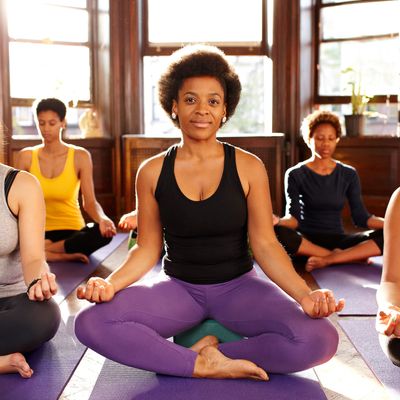
Earlier this week, in a stunning display of both online narcissism and fat-shaming foolishness, xoJane writer Jen Polachek wrote about the pain she experienced when a “young, fairly heavy black woman” placed her mat behind Polachek’s during yoga class. The young woman couldn’t do the poses, Polachek wrote; instead, in her “despair,” she stared with “resentment and then contempt” at Polachek’s “skinny white girl body.” Polachek left the class in tears. She had been “unable to focus on [her] practice.”
Amid the essay’s many problems (amply catalogued elsewhere), one that’s particularly striking is Polachek’s own failure to understand yoga. In describing her sense that yoga “seemed unable to accommodate [this woman’s] body,” Polachek made it clear that her knowledge of yoga was limited to the cult of yoga and not its culture. The culture of yoga, since its origins, has always been about uplift – of not only yourself, but also the world and its people around you. The cult of yoga has developed as it’s grown in popularity and begun to be treated like a sport, the original principles of peace and simplicity replaced by competition and one-upmanship.
The day I first started practicing yoga, I was close to 300 pounds and working to end my emotional eating habit. As a single parent in need of breathing room to de-stress, yoga felt like a perfect opportunity to get my head together. I didn’t have a mat, I didn’t have blocks or straps, and I didn’t even have “yoga clothes.” I did have a half-hour a day and a genuine curiosity. I was that “young, heavyset” yoga student, and what I learned from yoga — patience, forgiveness, humility, trust — saved my life.
What helped me most along the way were the people who encouraged me, assisted me in twisting just a little more this way, lifting just a little higher. They made me feel welcome, and supported me through a triple-digit weight loss. So when Polachek writes, “If I were her … I would want as little attention to be drawn to my despair as possible,” I cringe. Refusing to look at me simply because I was fat, black, and seemingly struggling my way through the class wouldn’t have helped me; it would’ve made me feel unwelcome, uncomfortable, and ensured that I’d never return. When Polachek wonders why yoga isn’t more inclusive or diverse or accommodating, I have to wonder — what yoga is this woman practicing?
Yoga transcends race, and always has. It has always accommodated nonwhite bodies — it was created by them, as it happens. The very words used to define and describe poses and the way they make us feel is in Sanskrit, an Indian language. To ignore that is to erase the culture of yoga and those who created it.
Yoga has always accommodated bodies different from Polachek’s, too. That’s what good teachers are for. Modifications and progressions are an essential part of the practice. People with injury can recover better with yoga; people who fail to exercise humility can injure themselves with yoga. You cannot take someone further in their practice without meeting them where they are. And, as should be obvious but apparently isn’t, unfit and inflexible bodies come in all shapes and sizes, and all could use the support of a good teacher.
Yoga, as practiced in large swaths of the U.S., is a luxury that requires both time and finances. Turning it into a status showdown – of who has the fanciest mat, the most fashionable yogawear, the leanest physique – makes it even more hostile.
The cult of yoga leaves us with people who boast of their “well-versedness” (as Polachek does) instead of using their knowledge to help a fellow student learn. The cult of yoga leaves us with people who focus on what classmates are wearing (is her “tastefully tacky” sports bra better than my tastefully tacky sports bra?) and how to best them instead of paying attention in class. The cult of yoga deems it appropriate to snark on someone’s body and abilities instead of acknowledging that everybody starts somewhere. The cult of yoga has left us with a student who would rather run home and write an essay about her own failures of empathy than use her emotions to make a difference. The cult of yoga is ruining the culture that makes it so marvelous and valuable.
This isn’t an objection to yoga’s trappings — the blocks, the straps, the rubber mats, and (yes) even sometimes, the tastefully tacky sports bras. They all have their place. This is a call for us all to practice the fullness of yoga, the mental as well as the physical. It’d encourage a lot more people to experience the joys of the practice, because we’d be embodying the changes we wish to see in the world.




